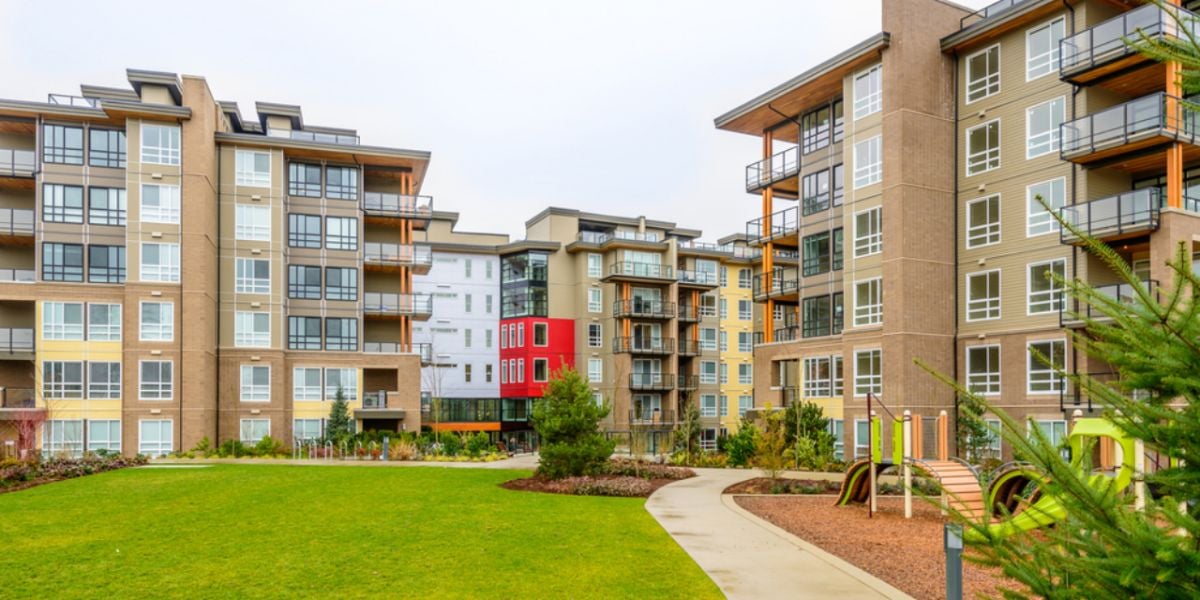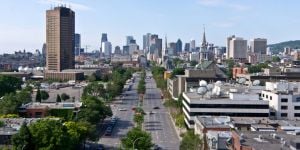
When you arrive in Vancouver, finding suitable housing will likely be one of your top priorities. In this article, we'll provide you with comprehensive information about the real estate market in Vancouver and common practices in the area.
Securing affordable housing in Vancouver can be quite challenging. As the capital of British Columbia, Vancouver stands out as one of Canada's priciest cities, along with Toronto, in terms of expensive real estate markets. However, the city's unique blend of urban and natural surroundings contributes to an unparalleled quality of life, attracting many immigrants. If you have a job in Vancouver, can demonstrate your ability to pay rent on time, and are willing to invest time in the housing search, you're likely to discover the ideal home for yourself!
As of September 2023, a report from Rentals.ca indicates that the average rent for a one-bedroom apartment in Vancouver stood at CAD$2,988, while a two-bedroom apartment was priced at C$3,879. These figures naturally fluctuate based on factors like the apartment's location, proximity to services, and its position within the building, among other factors. In August 2023, WOWA's analysis of the Vancouver real estate market revealed a benchmark price of C$1,208,400 for a home in Greater Vancouver. Opting to share a home can offer better value, particularly for newcomers who not only save on rent but also get the chance to connect with new people in their adopted city. Shared rooms in Vancouver generally range between $700 and $800 CAD, or possibly more.
Considering the significant investment at stake, we recommend taking your time and postponing your final housing decision until after you've arrived. Initially, you might consider options like short-term sublets, hostels, or Airbnb accommodations. This approach allows you to inquire among friends and colleagues, gather local recommendations, and explore various residential areas to determine the best fit for your needs. Keep an eye out for "Vacancies" signs and explore classified ads in Vancouver real estate-focused newspapers and magazines. This way, you can make a more informed decision about your long-term housing arrangement.
Real estate websites such as Craigslist, RentFaster, and Padmappe,r as well as Facebook groups dedicated to housing and Vancouver's immigrant communities, will also help you in your search. Be organized to optimize your chances. Have your Canadian phone number and Social Insurance Number (SIN) handy when visiting apartments. Finally, stick to your budget, and don't be tempted by overpriced housing!
Vancouver's neighborhoods
With a population exceeding 670,000 residents, Vancouver is divided into twenty-two neighborhoods. Your decision on where to live will likely hinge on factors such as your workplace, school, or the location of your children. Nevertheless, getting around Vancouver is generally convenient, as most destinations can be reached on foot, by public transit, or by bicycle. The city boasts an extensive transportation network, including three subway lines referred to as the SkyTrain, commuter trains, plenty of buses, and even boats connecting downtown Vancouver to North Vancouver. Night owls will find about a dozen buses in operation during the night, while the subway typically closes around 1 am and reopens around 5 am.
According to Metro Vancouver's home source blog, some of the priciest neighborhoods in Vancouver include Shaughnessy, West Side Vancouver, Kerrisdale, Kitsilano, Point Grey, and Coal Harbour. While many are drawn to Downtown Vancouver for its attractions, it's not affordable for everyone. The West End, False Creek, Yaletown, and Gastown neighborhoods offer slightly more budget-friendly options, remaining well-connected and close to the city center. Gastown, in particular, is a hub for artists, musicians, filmmakers, fashion designers, and other creatives. Despite being a tourist hotspot, Gastown has also become a burgeoning center for start-ups, with numerous tech companies and innovative businesses establishing themselves in the area. The West End charms residents with its tranquil atmosphere, proximity to the city's beaches, and the renowned Stanley Park.
Davie Village, the lively LGBTQ+ district, is just around the corner, offering a variety of restaurants, cafes, and boutiques. Other popular and lively neighborhoods include East Side, Commercial Drive, Main Street, and South Vancouver. Kitsilano is definitely worth exploring, with its mountain views and laid-back atmosphere attracting both tourists and locals. Kitsilano Beach stands out as the most popular and lively beach in the city, closely followed by English Bay and Sunset Beach in the West End.
On the other hand, Downtown East Side is recognized as Vancouver's poorest neighborhood. Situated right next to Chinatown, East Hastings Street is notable for its significant homeless population spread across several city blocks. While rents may be more affordable in this area, it's not advisable to live near East Hastings due to the daily exposure to human misery.
Rental rules in Vancouver
When opting to rent an apartment in Vancouver, it's essential to understand your rights as a tenant to prevent any potential conflicts with the landlord. Firstly, it's important to be aware that a landlord cannot deny you accommodation based on factors such as your origin, skin color, religion, family situation, or sexual orientation. If this is the case, you can contact the following organizations:
- B.C. Human Rights Clinic: 1 (855) 685 6222 (service in English);
- Tenant's Right Action Coalition: 1 (800) 665 1185 (service in English);
- B.C. Human Rights Tribunal: 1 (888) 440 8844.
However, your landlord has the right to refuse accommodation if you have pets.
In British Columbia, the Residential Tenancy Act regulates landlord–tenant relations. Although this legislation mandates landlords to draft tenancy agreements in writing, it also acknowledges that a tenancy agreement can be either "oral, express, or implied". This implies that, in British Columbia, you and your landlord don't necessarily have to sign a written agreement to establish a legal tenancy. While oral tenancies are covered by the Residential Tenancy Act, having a signed, written agreement with your landlord is always a safe practice.
Before agreeing to rent in Vancouver, make sure to factor in additional costs beyond the rent. Expenses like electricity, heating, hot water, and Internet charges may not be included in the rent amount. Additionally, it's important to establish a clear rental period with the landlord. Please note that you are obligated to pay rent for the agreed-upon duration, even if you decide to move out, unless your landlord agrees to rent the unit to someone else. In Vancouver, rentals typically have yearly or monthly terms, and apartments are available for lease throughout the year.
Landlords have the right to request proof of employment and references from your previous landlords. If you're a newcomer, undergoing a credit check can be a challenging process. Upon arriving in the country, you won't have a credit history until you've opened a Canadian bank account and started paying bills. However, with perseverance, you're likely to find a landlord familiar with renting to newcomers.
In addition, landlords might require a security deposit, usually not exceeding half of the monthly rent. This deposit is refundable at the end of the lease, provided there is no damage to the property. If you're transferring funds from your bank account in your home country, it may take a few days for the money to appear in your Canadian bank account.
It's important to carefully read and understand the terms of the lease before agreeing to it. If there's anything you don't comprehend, don't hesitate to ask questions for clarification.
After signing the lease, ensure you have a way to reach your landlord when needed, especially in case of damage not caused by you. It's important to note that your landlord cannot enter your home without giving you 24 hours' notice, except in emergencies.
If you encounter any disputes with your landlord or are uncertain about the legal aspects, feel free to reach out to the Residential Tenancy Branch at 1 (800) 665 8779. You can also refer to the Housing & Rental section of the government for additional guidance.
Important:
Don't hand over any money without visiting the property first! Some online accommodation ads in Vancouver may be fake or the photos may be old. Keep in mind that landlords don't usually ask for cash for rent.
Good to know:
To learn more about the vocabulary used in housing classifieds in Canada, see our article Housing in Canada.
Buying a home in Vancouver
If Vancouver's real estate prices don't put you off, you can explore classified ads and explore the diverse neighborhoods across the city. If you decide to enlist the help of a real estate agent, they will handle all the necessary procedures. You can find contacts in the yellow pages of your telephone book or by searching online. It's crucial to ensure that the real estate agent you choose is trustworthy.
Once you've identified a house, the next step is to make an offer to purchase. If you're working with a real estate agent, they will assist you in preparing the offer. If your offer gets accepted, you'll need to engage a lawyer or notary to facilitate the transfer of the property into your name. You can find legal professionals online or ask your real estate agent for recommendations.
Just like with renting, it's crucial to stick to your budget when purchasing a home. Consider not only the upfront costs but also factor in annual property taxes, home insurance, registration fees, various taxes associated with buying a home, maintenance or renovation expenses, as well as real estate agent or notary fees. Additionally, don't forget about ongoing costs such as heating, electricity, hot water, and sewage. We highly recommend obtaining insurance to safeguard your home and belongings.
When making an offer on a house, it's advisable to include a condition that the sale is contingent on a professional inspection of the property. This provides the flexibility to cancel or adjust your offer if the inspector identifies significant issues with the house. Once the inspection is completed, the inspector will furnish you with a home inspection report. You can go over this report with your real estate agent, allowing you to determine whether the house requires repairs that may impact the agreed-upon price. To find a licensed home inspector, you can visit resources such as "Hiring a Home Inspector" or the Canadian Association of Home and Property Inspectors.
Buying a home in Vancouver is notably easier if you're not a temporary resident or a newcomer. Canadian banks typically assess your credit history when deciding on bank loan approvals. Moreover, if you're not a permanent resident, there might be a waiting period before you can make your dream home purchase in Vancouver.
It's important to note that starting January 1, 2023, the Non-Canadian Residential Real Estate Prohibition Act prohibits non-Canadians from acquiring residential real estate in census metropolitan areas (CMAs), including Vancouver, and census agglomerations (CAs). This restriction is in effect for a duration of two years.
Useful links:
We do our best to provide accurate and up to date information. However, if you have noticed any inaccuracies in this article, please let us know in the comments section below.








